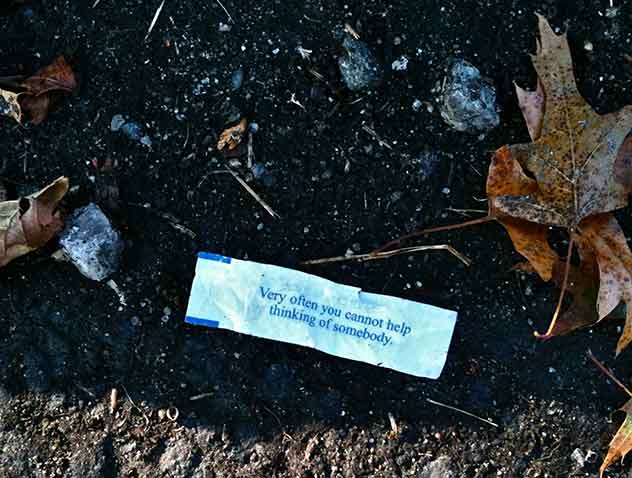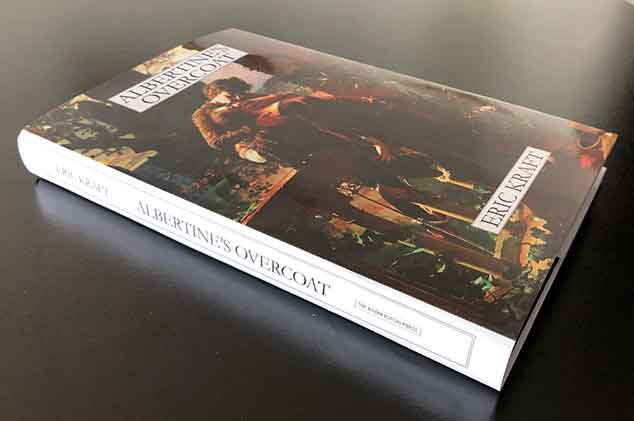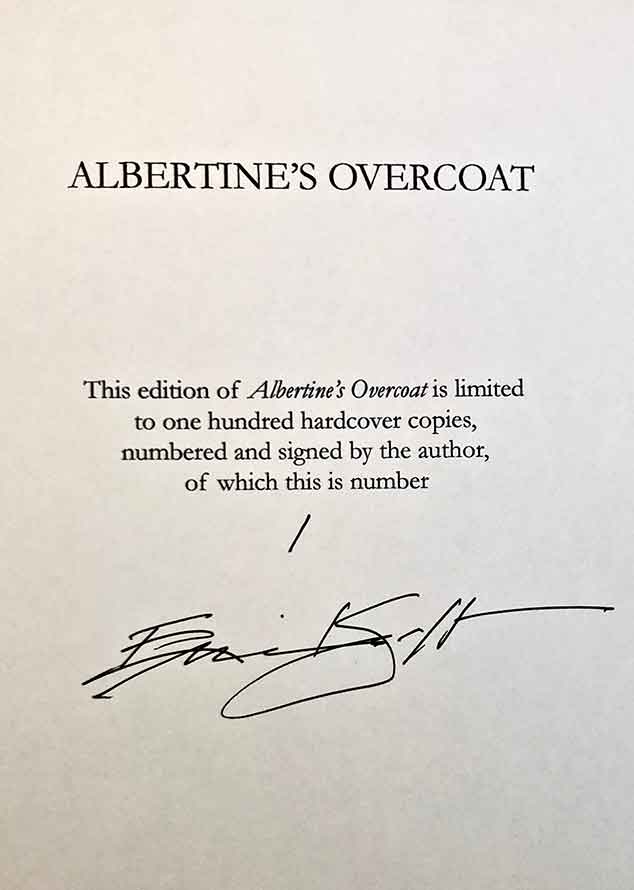
ALBERTINE’S OVERCOAT
A Novel
by
ERIC KRAFT
Available Now

Cover Image: Julius Kronberg, Romeo and Juliet on the Balcony (detail, 1886)
On April 16, 2018, The Babbington Press published Eric Kraft’s new novel, Albertine’s Overcoat.
Albertine’s Overcoat is the eleventh novel in Kraft’s voluminous work of fiction, The Personal History, Adventures, Experiences & Observations of Peter Leroy.
Peter Leroy is in danger of becoming an arrogant, insufferable little egoist. Then something happens that saves him. He falls in love with Albertine Gaudet. That is the end of egoism—and the start of one of literature’s great romances.
Indefatigable memoirist that he is, Peter doesn’t merely tell the story of his wooing and winning Albertine. He interweaves that story with an account of the troubles that beset him during the writing of the story. Among the obstacles are self-doubt, procrastination, and the demanding clients for his memoir-ghost-writing service Memoirs While You Wait—but that’s not all. He begins getting telephone calls intended for a local business, Peerless Television Service and Repair. These oddly compelling calls lure him out of the isolation of his writing room and into the lives of the callers.
The result is a poignant, thoughtful meditation on the frustrations of everyday life, the transitory nature of fame and success, persistence, loyalty, the vanity of human wishes, luck, realism, and romance.
A Sample
(Chapter 1)
|
“Tell me a story,” said the Baroness, staring out despairingly at the rain; it was that light, apologetic sort of rain that looks as if it was going to leave off every minute and goes on for the greater part of the afternoon.
Saki
“The Story of St. Vespaluus”
IN AMERICA there is a widespread and longstanding belief in the wisdom of small-town folk, the untutored people whom city slickers call rubes and bumpkins. When I was a small-town boy in Babbington I was one of the believers, but by the time I was a small-town teenager I had become a doubter. My doubts were confirmed at the end of the summer between my junior and senior years at Babbington High School.
During that summer, I attended the Summer Institute in Mathematics, Physics, and Weaponry in Corosso, New Mexico. The Institute was sponsored by Our Government, working through the privately-funded Preparedness Foundation, to train whiz kids to build rockets, satellites, and fearsome weapons to counterbalance the rockets, satellites, and fearsome weapons being built by whiz kids in Foreign Powers. I applied, but I wasn’t accepted. My friend Matthew Barber was accepted—and that annoyed me. Why him? Why not me? I vowed that I would go to the Institute, accepted or not. Determined lad that I was, I built a single-seat airplane in my family’s garage. I named it Spirit of Babbington. I rode (note the verb) that little airplane to New Mexico, and I spent the summer impersonating a student, with forged papers and the enthusiastic cooperation of the other students, even Matthew.
I learned a lot at the Institute that summer, but it wasn’t anything I learned there that convinced me that small-town folk are not as wise as they’re cracked up to be. It was the reception that Babbington gave me when I returned.
When I came rolling back into town astride Spirit of Babbington, the townspeople took me to their hearts, hoisted me on their shoulders, and declared me their local hero. They should have known better. Given the fact that they had seen me roll into town on Main Street, on the street rather than soaring overhead, looping, swooping, barrel-rolling, and diving, they should have realized that Spirit couldn’t fly and I had never flown her. Instead, they ignored the evidence of their eyes and believed what they wanted to believe: that Spirit and I had flown to Corosso and back, and that what I had done was, for that time and for a boy my age, a hero’s work. The whole town believed it. My mother believed it. Even my father believed it—well, almost.
Did I laugh at them? Did I ridicule those rubes and bumpkins for wanting a hometown hero? Certainly not. Why should I shatter their illusions? They wanted a hero. I would be their hero.
THE MORNING AFTER my return was a Sunday morning late in the summer. I lay in bed, awake, thinking that I might be justified in lingering in bed, lazing a bit, giving myself some time to think about what a fine and interesting person I’d become: a very big fish in the small pond of Babbington, the kind of guy who gets up and gets going and gets things done.
I got up and made my way downstairs.
I entered the kitchen.
“Hail the conquering hero!” said my mother, and she said it with love and admiration, not with the sarcasm you might expect from a parent whose son hasn’t mowed the lawn all summer.
My father sat at the dining table, reading the local newspaper, the Babbington Reporter. I stepped up to “my” chair, the chair I usually took when we gathered for family meals, and stood behind it. I gripped it along the back. I ran my hands along the wood. “It really is good to be back,” I said, and for a moment I felt as if I’d been away much, much longer than I had.
My father looked up from the paper. “Hail the conquering hero,” he said. He extended toward me the section of the paper that focused on local news. With narrowed eyes, he said, “Don’t let it go to your head.”
There I was, on the front page, hailed as “The Birdboy of Babbington,” the conquering hero.
MY MOTHER offered her conquering hero a cup of cocoa and a slice of toast.
I read the article in the Reporter and drifted into a reverie in which I was enjoying the attentions of Miss Clam Fest, a buxom blond beauty who had graduated from my high school several years earlier and, in open voting at the Clam Festival in the spring before I began my heralded journey, had won the right to wear a rhinestone-studded crown.
“I’d love to hear about some of your experiences,” she was breathing into my ear.
“I don’t know where to begin,” I said. “There’s so much to tell.”
She began unbuttoning my shirt. “Why don’t you begin at the beginning?” she said suggestively. She slipped her hand inside the shirt and ran it over my chest.
I began unbuttoning her blouse. “Well, Miss Clam Fest,” I began, but then I thought, I can’t call her “Miss Clam Fest.” What’s her real name? I think I used to know. But now I can’t seem to think of her as anyone but Miss Clam Fest. Say—that’s interesting. Her status as Miss Clam Fest has completely erased her former status as whoever she was. Will that happen to me? Will I become the Birdboy of Babbington and cease to be Peter Leroy? And will something be lost in the translation?
“What’s wrong?” she asked, or panted.
“I don’t think this is the right time or place,” I said.
“That’s not it,” she said. “Something distracted you. I could feel you—slipping away from me.”
“Yeah, maybe,” I admitted. (Now, looking back at this little scene, I see that what had distracted me was myself. I can hardly believe it—but there it is.)
I dunked my toast in my cocoa, as I’d done for years. While I watched the dunked portion of the toast soak up some cocoa, gauging the degree of soaking, ready to remove it when it reached the right degree, Miss Clam Fest clucked her tongue and said, “I’m surprised at you.”
“Oh?” I said. “Why is that?”
“I would think that somebody who’s tasted life as you have, who’s taken a mighty swallow on the way toward drinking life to the lees, wouldn’t childishly dunk his toast in cocoa.”
“I wouldn’t call it childish,” I said.
“I would,” she said with a pout. “Not only is it childish, but it’s also redundant. You ate buttered toast dunked in cocoa on the day of your departure from Babbington.”
“How do you know that?” I asked, alarmed.
“You’d be surprised how much I know about you,” she said.
“How?” I asked.
“Well, I don’t know too much about the science underlying the phenomenon,” she said, “but I think that when you start fantasizing about me you open a channel of communication that runs two ways.”
“Oh?” I said, more alarmed now.
“If you ask me,” she said, “I think you ought to start this day in a way that emphasizes the start of whatever exploit you’re going to undertake next. A repetition of that childish toast-dunking is not the way to make a new beginning.”
“Toast-dunking could become a tradition with me,” I said, “something that marks the beginning of every new adventure.”
“What?” she asked, apparently taken aback by my manly assertiveness.
“Rather than a mere relic of my childhood,” I continued impressively, “my repeated toast-dunkings would become milestones along my path to maturity. Each time I dunked my toast, I’d see the dunking through older and wiser eyes.”
“Are you being impertinent?” she asked with, perhaps, the hint of a tear in her eye.
“Are you talking to me?” my father asked.
I looked at him. I couldn’t imagine why he’d think that I’d been talking to him.
“You said something about being impertinent,” he said. He had lowered the section of the newspaper that he’d been reading, and he was scowling at me over it.
“Oh. I might have,” I said. “Without realizing it. It’s, ah, my word of the day.”
“Word of the day?”
“Yeah. The word of the day. It’s a trick I learned out in New Mexico. At the Summer Institute. Learn a word a day. That helps you get ready for the Comprehensive College Competency Exams.”
“That’s very smart,” said my mother. “Good for you! What did you learn about impertinent?”
“It’s—well—ah—basically it’s the opposite of pertinent.”
“But impertinent means ‘rude,’ doesn’t it?” she said.
“Right,” I said confidently.
“Then why doesn’t pertinent mean ‘polite’?” she asked.
“I have no idea,” I admitted.
“I hope that doesn’t come up on the Comprehensive College Competency Exams,” she said, knitting her brows with worry.
“Me, too,” I said.
I brought my toast to a position above my cocoa again, cautiously, tentatively, waiting to see if Miss Clam Fest was watching me. She didn’t seem to be, but as soon as the toast touched the cocoa, she said, “I think you’re a bit too full of yourself, young man.”
“Oh?” said I. (That “young man” had hurt, but I wasn’t going to let her know it.)
“I grant that you had some interesting experiences during your summer travels and summer study,” she said, “possibly even life-altering experiences.”
“You can say that again,” I said.
“I suppose that you suppose your Babbington friends will be eager to hear about those experiences because they were experiences that your friends didn’t have, stuck, as they were, here at home.”
“I sure do,” I said.
“I suppose that you suppose those friends will be impressed by the many ways in which those experiences have changed you.”
“They will,” I said with heartfelt conviction.
“Hmmph.”
“Some will,” I said with less conviction.
“Hmmph.”
“Raskol will,” I said.
I considered Raskol Lodkochnikov my best friend. He was a generous listener, and he would allow me to ramble on for hours if we were spending a lazy day along the bulkhead beside the Bolotomy River, at the edge of Bolotomy Bay. I was sure I could count on him to welcome my stories, my perceptions, and my new wisdom.
“He isn’t really interested,” said Miss Clam Fest. “Half the time you’re talking he isn’t listening at all.”
“Not true,” I said.
“Oh? Ask yourself this question: Does he ever press you for details?”
“Press me for details?”
“Does he ever ask a question that shows a deep interest in knowing all the juicy details of one of your fascinating experiences, or does he just let your stories wash over him without responding to them with anything you could honestly call evidence of avid interest? I think you’ll have to admit that sometimes you find it hard to tell whether he actually heard what you said when you were confiding in him.”
“He’s a boy of few words,” I said. “He’s not the type who presses people for details. He probably feels nothing but contempt for those who do. Even so, he’s asked me to tell him the story of my first airplane ride, in detail, several times. So there.”
“I wonder whether he hasn’t reached the saturation point when it comes to that story,” she said thoughtfully. Then her little pout returned and she said, “I suppose it doesn’t really matter to you whether he listens or not, since he has such a sexy older sister.”
“I’m going to go down to Raskol’s,” I announced, rising from the breakfast table.
“What about the lawn?” asked my father.
“I’ll mow it this afternoon,” I said.
“And when are you going to finish painting the garage?” he asked.
“The garage?”
“The garage,” he said.
“You got my friends to paint the garage when they came here to help me build Spirit of Babbington,” I said.
“Your friends hardly made a dent in it.”
“Can’t I have one day off?”
“You’ve had the whole summer off.”
“No, I haven’t. I worked hard out there in New Mexico—”
“Oh, Bert,” said my mother. “Let him have one day off.”
“Okay,” said my father. “You can have the whole weekend off. But you’d better make the best of it, because you’ve only got a week before school starts, and that garage has got to be painted—and I mean painted properly. Do you hear me?”
“Yeah, I hear you,” said the conquering hero, and he let himself out the side door. |
Scroll down for another sample.
“It was wonderful to immerse myself again in Peter’s world, and to emerge blinking as if just awakened, delighted, beguiled.”
George Witte

“A great love story—witty, passionate, kind. Where Gogol’s overcoat transforms individuals, Kraft’s characters transform clothes—and, of course, language. Enjoy.”
Michael Lund
Another Sample
(Chapter 2)
Vladimir: Now what did we do yesterday evening?
Estragon: Do?
Vladimir: Try and remember.
Estragon: Do . . . I suppose we blathered.
Vladimir: (controlling himself) About what?
Estragon: Oh . . . this and that I suppose, nothing in particular. (with assurance) Yes, now I remember, yesterday evening we spent blathering about nothing in particular. That’s been going on now for half a century.
Samuel Beckett
Waiting for Godot
FIFTY YEARS LATER, I lose my wallet. The chain of events leading to the loss of the wallet begins when Albertine and I are having a drink at Superior Custom Tailoring. We’re back in Manhattan after months on the road, having made our wandering way to New Mexico and back, retracing the route of the trip that I made in the summer before we met. During our trip, I worked on a draft of Flying, the tenth volume of my memoirs. It interweaves an account of the original trip and an account of the retracing trip. My work on that book isn’t finished yet, this evening, but a part of my mind has already begun to turn to the volume that will follow it, the one that will tell the story of my meeting Albertine, falling in love with her, wooing her, and winning her, this one.
Superior is a cocktail lounge, but the people who run it don’t want it to be just another cocktail lounge, so they’re pretending that it’s something a little different from a cocktail lounge: a speakeasy. It’s on the second floor of a nondescript building on Houston Street, and its entrance is nearly unmarked: only a discreet brass plaque beside the door bears its name in small type. Inside the door, narrow stairs lead past faded magazine advertisements with illustrations of men and women in fashions several decades out of fashion. On the second floor, a door with a frosted window repeats the name of the firm, and a sign on a chain hung over the door handle says SORRY, WE’RE CLOSED. If you ignore the sign and open the door you will find yourself in a quiet and sumptuous hideaway, and, on this night, you will find Albertine and me sitting at the bar, sipping our drinks, congratulating ourselves on a trip successfully completed, saluting a city whose citizens are so clever and generous that they opened this handsome place in anticipation of our return, and discussing the relative balance of memory and invention, fact and fancy, in my memoirs.
Emboldened by her second martini, Albertine is saying, “I feel, or I fear, that you’ve begun sticking too close to the facts, relying on the way things happened, avoiding the demanding work of reimagining the past and enriching what was with what might have been.” Here she puts her hand on my arm. “In short,” she says, “I think you’ve begun taking the easy way out, settling for experience tethered to the ground rather than what Henry James so memorably called ‘experience liberated . . . experience disengaged, disembroiled, disencumbered.’”
I’m about to reply that I may have entered my taking-the-easy-way-out years when a burly man next to us suddenly declares, “Martini prices have skyrocketed!”
We glance in his direction and see that he’s examining his check.
“You think martini prices are bad,” says his companion, a redheaded woman not nearly so burly, “you should look at housing prices—they have literally skyrocketed.”
Albertine looks at me and raises an eyebrow. “Did you hear that?” she asks silently, inviting me to read her luscious lips.
I answer with a nod and a shrug.
ON THE WAY OUT, we retrieve our coats, and in helping Albertine into hers I hug her and into her ear I whisper, “Well, he was right about the martini prices, but she might be wrong about housing prices.”
On the way down the stairs, Albertine examines the clothing ads more closely than she did on the way up. One in particular, near the door to the street, makes her stop and take a long look. She squeezes my arm and says, “Doesn’t this remind you of—”
“The coat,” I say.
“Yes,” she says.
I photograph the ad with my phone. We look each other in the eyes, and she stands on her toes to give me a kiss.
THE NEXT DAY, we check the real estate listings. During our time on the road, we didn’t pay any attention to the cost of Manhattan housing. We housed ourselves in hotels, motels, and country inns. We didn’t know how long our trip would last. We weren’t even sure that we’d return to the city when our traveling was done. We weren’t sure that our traveling would ever be done. Now, however, we are back and we intend to stay. Manhattan housing prices mean something to us.
“Housing prices have skyrocketed,” mutters Albertine. “We’re going to have to find a place where the prices haven’t rocketed quite so high.”
“Do you mean outside the city?” I ask.
“I’m afraid so, unless we could squeeze ourselves into a very small apartment.”
“How small?”
“One bedroom, I think.”
“That would mean one bathroom,” I say.
At once she says, “I’ll undertake an online survey of the surrounding suburbs. We’ll find something.”
Because all our belongings are in storage, and we’re shuttling among friends, squeezing ourselves into their apartments for a night or two and then moving on, we’re extremely eager to get ourselves into a place of our own.
“Where would you like to go?” I ask.
“Where would you like to go?” she asks.
“I would like to go where you would like to go,” I say.
“Okay,” she says. “We’ll go to Balham.”
“Balham?” I ask.
“In Westchester County,” she says. “It was once widely known as ‘The Gateway to the Bronx,’ and it’s less than thirty minutes from Manhattan by train.”
SO WE MOVE to an apartment on the twenty-third floor of a new building in Balham. One morning, after we’ve settled in, I’m sitting in my new workroom in that apartment, staring at my computer screen, trying to work at revising Flying but having a hard time focusing on that pleasant task because an unpleasant thought intrudes, this thought: You ought to be doing something to make some money.
I sigh. Who can argue with that?
I support the Leroy ménage by assisting people in writing their memoirs, and if they haven’t the time or patience to produce a memoir, even with my assistance, I’ll ghostwrite it for them. I’m a hack.
I’m nearly resigned to playing hack for the rest of the day when a happier thought strikes me, this one: A little time spent with Albertine in the past might give me the lift I need to soar through the work of finding new clients, might send me back to work with a light heart instead of making me force myself to trudge through the day grumbling and moaning. Making a few notes, jotting a few ideas, wandering through the memory of our romance for a while—just what I need.
The telephone rings.
I let it ring until my recorded voice on our antiquated answering machine says, “You’ve reached Memoirs While You Wait. Please leave a message.”
After a moment of hesitation, a voice on the other end of the line says, “Hello?” After another hesitation, the voice asks, “Are you peerless?”
That is a question that demands a response. I pick up the handset and say, with confidence, “Yes, I am, and I have testimonials to prove it, if you require them.”
“That’s good,” says the voice. “I’m glad to hear that, because a lot of you people don’t have a great reputation.”
“Sad, but true,” I say. “Many of my fellow ghosts are unscrupulous, and many more are incompetent.”
“Ghosts?”
“Ghostwriters. Or, if you prefer, co-authors. Or collaborators.”
“I don’t know who you are, but I’m thinking you’re not Peerless Television Service and Repair, are you?”
“No,” I say, “I’m not.”
“You said you were when I asked.”
“I said I was peerless,” I say, “and in the ghosted-memoir racket, I am. I’m peerless. Without peer. Incomparable. Nonpareil. Tops. Hello? Hello?”
|
Available Now

Available Now

Available Now






|





